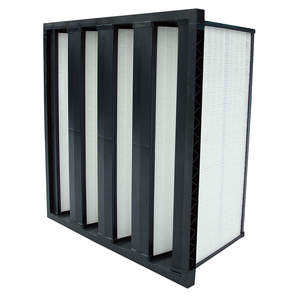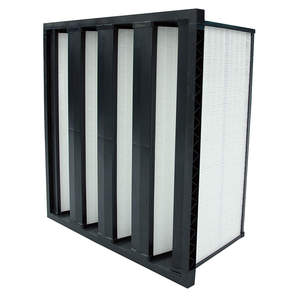(1144 products available)


































































































































































































AHU stands for air handling unit, a large piece of equipment used to regulate and circulate air as part of a heating, ventilating, and air-conditioning (HVAC) system. An AHU HEPA filter is an air filter that can remove at least 99.97% of particles from the air, including dust, dirt, mold, bacteria, pollen, and other airborne particles. HEPA filters can retain all but 0.03% of particles 0.3 microns in diameter (a human hair is generally 50-150 microns wide) or larger. They are the highest standard filters available and are mainly used in applications requiring very high levels of air quality. There are two main types of HEPA filter: the panel filter and the compact filter. The panel filter is made of pleated filter media that are separated by corrugated aluminum foil. It is suitable for use in air conditioning systems and air handling units, and it is designed to remove large amounts of dust from the air. The compact filter is similar to the panel filter, but it has a greater depth. It is mainly used in high-efficiency filtration systems, and it is suitable for use in cleanrooms, laboratories, and other areas that require very high levels of air quality.
When it comes to HVAC systems, the HEPA filter for AHU is usually rated at MERV 17 to MERV 20. The rating system indicates the filter's ability to trap very small particles. The higher the rating, the smaller the particles that the filter can catch. For this reason, MERV 17 to MERV 20 can capture 99.97% of particles as small as 0.3 microns. MERV 16 can capture very small particles, too, but not as many as MERV 17 to MERV 20. A MERV 16 filter can catch 95% of particles as small as 0.3 microns. MERV 15 can trap 90% of 0.3-micron particles, while MERV 14 can catch 75% of the same particle size. MERV 13 is capable of trapping 90-92% of 3.0-micron particles, MERV 12 up to 80-85% of 3.0-micron particles, MERV 11 60-70% of 3.0-micron particles, and MERV 10 can capture 50-55% of 3.0-micron particles.
Even though the HEPA filters for AHUs are strong, they still need some maintenance to keep working properly. The following steps should be taken to maintain the filters:
A HEPA filter in an HVAC system is beneficial for commercial use in various industries. Among them, the most common industry that uses HEPA filters for AHUs is the healthcare sector. Hospitals, clinics, and research facilities require clean, sterile air to prevent cross-contamination and the spread of diseases. Surgical theaters, isolation wards, and laboratories are some of the areas in healthcare facilities that need HEPA filters to maintain a clean and safe environment.
Pharmaceutical and biotechnology manufacturing facilities use HEPA filters to maintain the sterility of the production environment. These filters are used in clean rooms to prevent contamination of sensitive products like medicines and medical supplies.
Airports and transportation hubs need to use HEPA filters to ensure that the air passengers breathe is clean. This is important in reducing the chances of spreading airborne diseases among passengers. Also, public transportation like trains and buses can use HEPA filters to ensure that the air passengers breathe in is clean.
Schools, universities, and research facilities can also use HEPA filters to maintain a clean indoor environment. Especially in science laboratories, classrooms, and research centers, these filters can help to reduce the circulation of air contaminants. Office buildings can use HEPA filters to protect employees from indoor pollutants like dust, allergens, and mold spores. These filters help to create a better working environment that promotes productivity and well-being.
Hotel chains can also use HEPA filters in their rooms to attract health-conscious customers. Since HEPA filters can remove dust particles and allergens, they provide a comfortable and clean indoor environment for guests. Also, restaurant owners can use HEPA filters in their kitchens to maintain air quality by removing smoke, grease, and cooking odors. A restaurant with a HEPA filter can improve the working environment and enhance safety.
The first step is to determine the required air volume and size. Calculate the total air volume of the HVAC system using the formula: Air Volume = Area × Height (or Air Changes per Hour × Room Volume). Then, select a HEPA filter that matches the calculated air volume and the appropriate size to ensure it can handle the volume of air the system moves.
Many HVAC systems use HEPA filters with efficiency ratings between 95-99.97%. Choose an appropriate filter efficiency based on the level of airborne particle removal required in the specific facility or application. For example, hospitals and electronics manufacturing facilities may need to use filters with higher efficiency levels to meet stringent air quality standards.
HEPA filters are usually rated by the Minimum Efficiency Reporting Value (MERV) system, which indicates the ability of an air filter to capture both large and small particles. Choose the appropriate MERV rating range based on the specific needs of the facility or application. For example, a hospital with more critical air quality requirements should use HEPA filters with higher MERV ratings to achieve higher filtration efficiency.
Choose the appropriate frame material based on the specific needs of the facility or application. Typical frame materials include aluminum, stainless steel, and galvanized steel. For example, facilities with strict cleanliness and hygiene requirements may prefer stainless steel frames because they are easier to clean and maintain.
HEPA filters have a service life that depends on the specific application and operating conditions. In high-dust environments, more frequent filter replacement may be required to maintain optimal performance. Consider the replacement cycle of the HEPA filter to ensure that it can be replaced and maintained within the facility's operating parameters.
Some specialized applications may have unique requirements that cannot be met by standard HEPA filters. For example, in an electronics manufacturing facility, the HEPA filter may need to be customized to fit into a specific piece of equipment. If customization is necessary, work with a supplier who can provide engineering support and customized solutions to ensure the HEPA filter meets the facility's specific requirements.
Q1: What is the HEPA filter's lifespan in an AHU?
A1: Usually, the HEPA filter should be changed after 18 to 24 months. However, during the COVID-19 pandemic, people are encouraged to change the filter after every six months to prevent the spread of the virus.
Q2: What is the difference between MERV and HEPA filters?
A2: The HEPA filter has a better filtration level than the MERV filter. While the MERV filter can capture particles of 0.3 microns, the HEPA filter can capture particles as small as 0.03 microns.
Q3: What are the benefits of a HEPA filter?
A3: The HEPA filter provides many benefits to businesses. It can help to remove small particles from the air that can trigger asthma attacks and allergies. It can also help improve indoor air quality and reduce the spread of airborne diseases.
Q4: Can HEPA filters be sanitized?
A4: Yes, it is possible to sanitize the HEPA filter. First, vacuum the filter to remove any loose particles. Then, gently wash the filter with soapy water and allow it to dry thoroughly. Some HEPA filters can be replaced or recycled.
Q5: Can HEPA filters be used in commercial applications?
A5: Yes, HEPA filters can be used in commercial applications. They come in various shapes and sizes to fit different kinds of equipment. For instance, they can be used as final filtration in air handling units to offer clean air to the entire building.